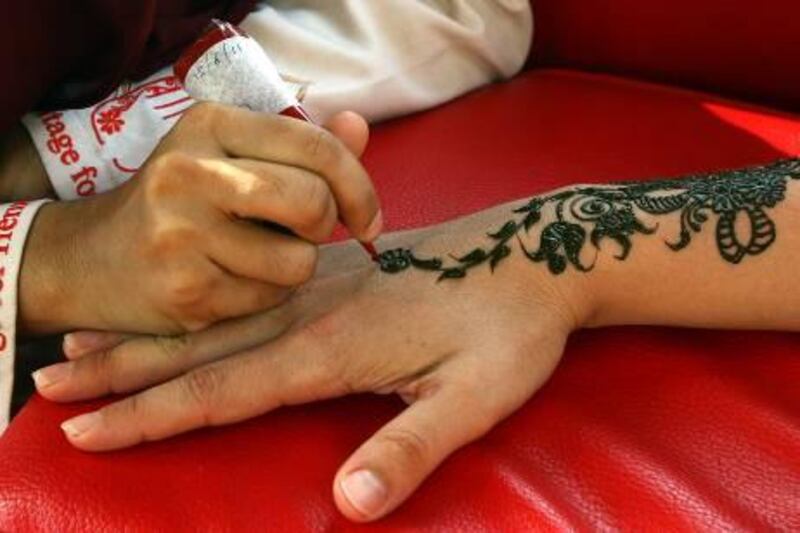ABU DHABI // Black henna is still available in shops and salons across the capital, a year after it was banned because it can burn and scar skin.
Those ignoring the ban risk a fine and loss of their licence, but one doctor reported no significant decrease in the number of patients needing treatment since the ban.
MORE UAE NEWS: Our pick of today's top local news stories
Last Updated: June 15, 2011
Arab Spring has not run its course, expert says Head of Omani think tank tells Abu Dhabi conference that second round will be stronger and more organised, similar to unrest in Tunisia. Read article
Food expert shocked by market hygiene The fruit, vegetable and meat markets in Abu Dhabi have not been abiding by food safety regulations, leaving the door wide open to bacterial contamination. Read article
Footballer sentenced to death for killing neighbour Former member of the UAE national football team is to face a firing squad for his part in a 2008 murder. Read article
Heavens to open up in lunar eclipse The eclipse will blot out the moonlight revealing stars that are not normally visible, from 10.22pm tonight until 2.02am tomorrow. Read article
[ MORE UAE NEWS ]
The municipality outlawed the variation of the natural dye used to decorate women's hands and feet last June because chemicals added to it can cause severe allergic reactions.
The most common additive, called p-Phenylenediamine (PPD), is used in hair dyes but can cause asthma and rashes.
Many beauty salons, however, still apply black henna if requested and the dye is available to buy.
This week, five of 20 randomly selected salons said they offered black henna.
"Nobody said it is not allowed. I did not receive any papers saying it is not allowed," said one clerk at a beauty salon in the Tourist Club Area. "We just let customers decide and we provide it if they insist they want to use it."
Traditional henna is reddish-brown and created by grinding the henna plant to make a paste. PPD and other chemicals, including benzene and petroleum, are added to darken the dye.
Because henna cannot be turned black without chemicals, municipal health officials warned customers to report infractions to the authorities.
"In case of any complaint, the henna samples are sent to the Health Authority - Abu Dhabi for laboratory analysis," said Khalifa al Romaithi, the director of public health for the municipality.
"If the results prove to be positive for PPD the case will be sent to court. Usually, a penalty and confiscation of the items will result."
The municipality carries out daily inspections and offenders risk losing their licences and being fined a minimum of Dh2,000. Henna brought into the country was also inspected, Mr al Romaithi said.
Many salons and henna centres said they complied with the law.
"People sometimes still ask but I can't put it on. I listen to the law," said one salon worker in Baniyas. "I never knew of anyone who had a reaction but I've heard stories."
Dr Safwan Khraisheh, a dermatologist at Gulf Diagnostic Centre Hospital, said he had not noticed a significant decline in patients requiring treatment for rashes from black henna since the ban.
"Black henna is a very big problem," Dr Khraisheh said. "The blisters are very itchy and very painful, and if it's not treated right away people can end up with infections and scars.
"Sometimes I see someone with this problem every day."
Black henna is not banned in Dubai and is a staple on desert safaris offered across the Emirates.
A study last year conducted by the Environment Agency - Abu Dhabi and the University of Sharjah found PPD concentrations of up to 29.5 per cent in more than 10 samples of black henna from across the UAE.
That number far exceeds EU regulations, which allow no more than a 6 per cent PPD concentration in hair dye. PPD has not been approved for use on the skin by the EU or the US Food and Drug Administration.
Research conducted last year by UAE University linked benzene in synthetic henna dyes to leukaemia in Emirati women, who suffer from the disease at higher rates than male Emiratis.
An awareness campaign will help to reduce the use of the banned substance in the capital, Mr al Romaithi said.
The municipality released a guide to salon and cosmetic centres this year, and information has been distributed at universities and malls.
* With additional reporting by Zainab Mudallal





